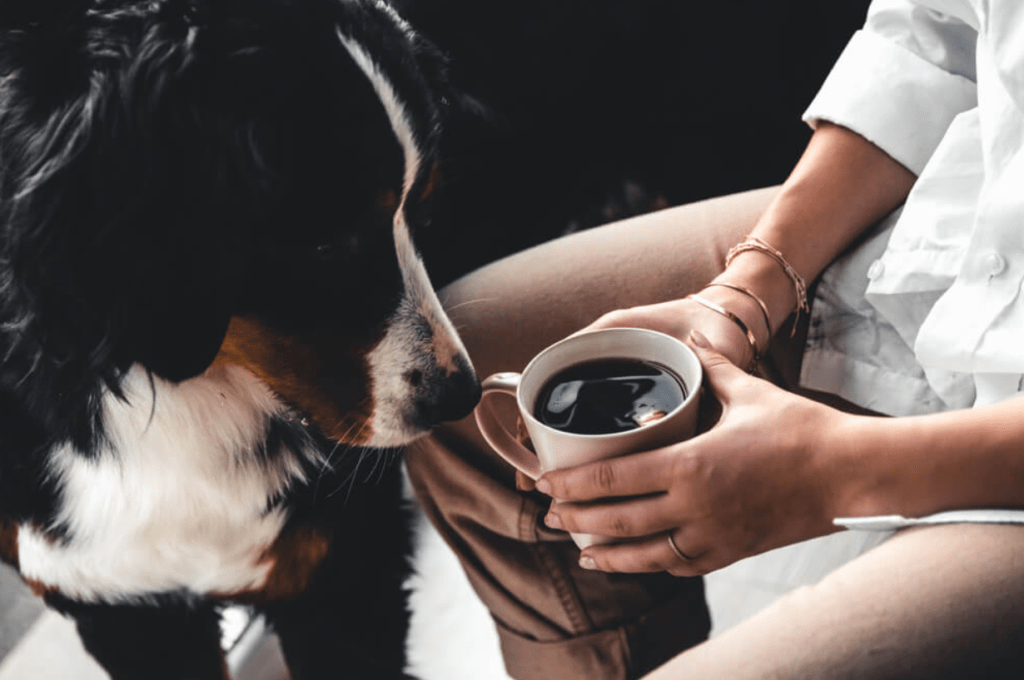Can Dogs Have Coffee?
As dog owners, we often find ourselves sharing snippets of our meals with our furry friends. However, it is crucial to discern what foods are safe for dogs and what could potentially be harmful. One commonly asked question is, “Can dogs have coffee?” The answer is a resounding no. Let’s delve into the reasons behind this.

The Dangers of Caffeine for Dogs
The primary reason why dogs should not consume coffee is due to its high caffeine content. Just like in humans, caffeine acts as a stimulant for dogs, affecting their nervous system and heart rate. However, unlike us, dogs metabolize caffeine at a much slower rate, which can lead to an overdose. Symptoms of caffeine overdose in dogs include restlessness, rapid breathing, heart palpitations, muscle tremors, and even seizures. In severe cases, it can even be fatal.
No to Chocolate-Based Treats
We all know that chocolate is a big no-no for dogs due to its high caffeine content. However, did you know that some dog treats contain coffee or chocolate flavors? These treats may seem harmless, but they can still pose a risk to your dog’s health. Always check the ingredients of any store-bought treats before giving them to your furry companion.
Coffee Grounds and Beans
Even if you do not share your actual coffee with your dog, make sure they do not have access to any coffee grounds or beans. The concentrated levels of caffeine in these can be harmful to your dog, causing the same symptoms mentioned above. Keep your coffee supplies out of reach and dispose of used grounds and beans immediately.
Other Caffeinated Beverages
Coffee is not the only beverage that contains caffeine. Energy drinks, tea, soda, and even some medications may contain caffeine. As a responsible pet owner, it is essential to check the labels of these products and avoid giving them to your dog.
Alternatives to Coffee for Your Dog
If you’re looking for a caffeine-free alternative for your dog, there are plenty of options available. You can give them water flavored with chicken or beef broth, bone broth, or decaffeinated herbal teas. Just make sure that any treats or drinks you give your dog are specifically made for dogs and do not contain any harmful ingredients.
Effects of Caffeine on Dogs
Caffeine is a potent stimulant that has a significant impact on a dog’s system. It affects the central nervous system, heart, and muscles, causing a host of health problems. When dogs ingest caffeine, they can become restless, hyperactive, and suffer from excessive thirst, urination, and panting. Other more severe symptoms can include abnormal heart rhythms, hypertension, and a rapid heartbeat, known as tachycardia.
In addition to these immediate physical effects, caffeine can also lead to long-term health problems in dogs. Repeated exposure to caffeine can contribute to the development of heart disease and other cardiovascular issues. It can also lead to behavioral issues, including anxiety and hyperactivity. In severe cases, caffeine toxicity can result in seizures, collapse, and in some cases, death.

It’s essential to remember that there is no safe dose of caffeine for dogs. Even a small amount can have harmful effects, especially in smaller breeds. As such, all caffeinated products, including coffee, should be kept well out of reach of your pooch.
Healthy Alternatives to Coffee for Dogs
While our beloved furry friends can’t share our morning cup of coffee, there are many other safe and healthy beverage alternatives they can enjoy. One such option is dog-safe herbal tea. Several companies manufacture these teas, which are often made with ingredients like chamomile or ginger that can help soothe an upset stomach.
Another potential alternative is dog-friendly broth. Broths are a great way to hydrate dogs while also providing them with essential nutrients. You can make your homemade broths or purchase ready-made ones, but be sure to avoid those containing onions or excessive salt, which can be harmful to dogs.
Finally, the simplest and safest option of all is fresh water. It’s not only the best thirst-quencher, but it’s also essential for their overall health and well-being. Remember, while these alternatives might not provide the morning pick-me-up that coffee does, they are much safer and healthier options for your dog.
Frequently Asked Questions
1. Can I give my dog decaffeinated coffee?
While decaffeinated coffee has significantly less caffeine than regular coffee, it still contains trace amounts. Moreover, it could contain other substances that could potentially harm your dog. Therefore, it’s best to avoid giving any form of coffee to your dog.
2. My dog accidentally consumed coffee. What should I do?
If your dog accidentally consumes coffee, it’s crucial to contact your vet immediately. Monitor your dog closely for any signs of caffeine poisoning, including restlessness, panting, rapid heartbeat, or seizures.
3. What are some other foods that contain caffeine?
Other than coffee, caffeine can also be found in tea, chocolate, soda, and some medicines. Always make sure to check the labels of any food or beverage before giving them to your dog.
4. What can I give my dog instead of coffee?
There are many healthy alternatives to coffee for dogs. Dog-safe herbal teas, broths, or simply fresh water are great options. Make sure any treats or drinks you give your dog are specifically made for dogs and do not contain any harmful ingredients.
5. How much coffee is toxic to dogs?
Even a small amount of coffee can be harmful to dogs, especially smaller breeds. There is no safe amount of coffee for dogs, so it’s best to avoid it altogether.
Conclusion
In conclusion, it is best to keep coffee away from your furry friend. The high caffeine content can have severe consequences on their health, and the risks far outweigh any potential benefits. If you suspect that your dog has consumed coffee or shown symptoms of caffeine overdose, seek immediate veterinary attention. Remember to always provide your dog with healthy and safe alternatives, such as herbal teas, broths, or fresh water. Let’s keep our dogs happy and healthy by being mindful of what they consume. So the answer is no a dog should not be given any type of coffee.


It’s a shame you don’t have a donate button! I’d certainly donate
to this outstanding blog! I suppose for now i’ll settle for book-marking and adding your RSS feed to my
Google account. I look forward to brand new updates and will talk
about this site with my Facebook group. Talk soon!